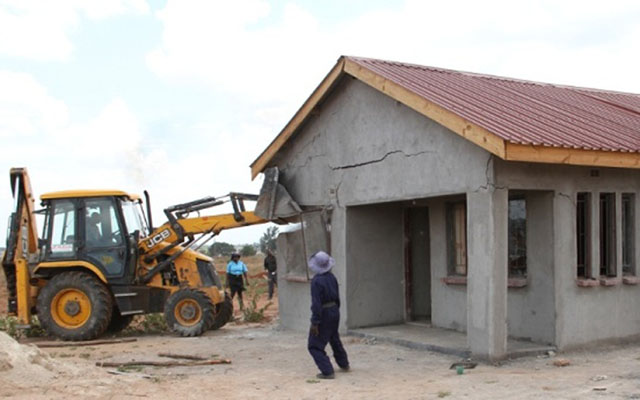Time to punish land barons


A bulldozer destroys a house at an illegal settlement along Airport Road in Harare last year
Christopher Charamba and Talent Gore Features Writers
On Tuesday, during the handover of Cde Chinx’s new home in Sentosa, Harare, the First Lady Dr Grace Mugabe spoke on Maslow’s hierarchy of needs. She mentioned how shelter was a basic need that one requires to survive.
In order to satisfy this and other needs on Maslow’s ladder, most if not all people aspire to be homeowners. Some buy already built houses or apartments while others purchase land in order to build their own houses.
Unfortunately, not everyone can afford to buy a home or land on which to build as this is a major investment.
So when one manages to do so, there is a great feeling of accomplishment.
Some however, have had this achievement stolen from them by unscrupulous individuals who took advantage of people’s desire for shelter and sold them land illegally.
One such person, as the First Lady pointed out, was Cde Chinx.
The First Lady questioned how it was that land was sold to an individual and that person was allowed to build a house on this piece of land to completion before the authorities came in and deemed this illegal.
“You see someone building his or her house from the foundation level to window and roof level until completion, then when they are about to move in, someone comes and says it’s an illegal structure.
“When the house was going up could you not see it? Such malice is not right,” she said.
Dr Mugabe bemoaned the fact that people who were earnestly looking to provide shelter for themselves would see their homes destroyed after they had been exploited.
She added there was need for investigations into the issue of land barons and those caught on the wrong side of law must be arrested.
“I am seeing bulldozers every day destroying houses. These perpetrators who would have allowed people to build should be brought to book. You cannot just destroy someone’s house just like that and go scot-free.
“These are the questions we are asking and we want answers. Who was the councillor during that particular time?
“We want to get the real story, not only the chorus that people built on undesignated land. Why don’t we go deeper, investigate issues, how it all started, how that piece of land was allocated to that particular person for him to say I own that land and the onus is on me to ensure development,” she said.
The issue of land barons and the illegal sale of land is not a new one and has been going on for years.
In December 2013, more than 14 000 residential stands allocated to home-seekers in Chitungwiza and Manyame Rural District Council were deemed illegal and the structures they had built were set to be demolished following a Government audit on illegal structures.
The audit team recommended the arrest and prosecution of land barons who are mainly housing co-operatives, councillors and village heads after it emerged that they looted and illegally sold 23 074 stands that did not belong to them, pocketing more than $20 million.
United We Stand Multi-Purpose Co-operative, which is believed to be run by some councillors and other influential people in Chitungwiza, was singled out as the chief land baron both in Chitungwiza and Seke.
In October 2014, a Harare City Council Audit Committee was tasked to investigate and report on land barons who are parcelling out invaded council land and charging desperate citizens exorbitant fees in Mufakose, Kuwadzana and Glen Norah, among other residential areas.
In October last year, three members of the Kuwadzana Home Industry Housing Co-operative were slapped with five-year jail terms for illegally parcelling out 24 hectares of council land.
The trio converted an open space reserved for recreational purposes into illegal housing stands, prejudicing council of $1,1 million.
The same month, more than 3 000 families were left homeless after their houses built on land belonging to BAK Storage Company along Harare-Masvingo Road were razed to the ground by the Sheriff following a High Court order to evict the illegal occupiers. The houses were built on 70 hectares of land belonging to the storage company.
At the time BAK Storage property manager Mr Lovemore Chivaura said the company sympathised with innocent home seekers who might have been duped by land barons into participating in illegal settlements.
The crisis of land barons has continued to persist as action on perpetrators has been slow and somewhat ineffective.
Last year, legislators called for stiffer penalties on land barons in the wake of several people being duped by criminals who irregularly acquire pieces of urban land and sell them to desperate home-seekers.
The call was made during debate on the Land Commission Bill which seeks to establish a land commission to carry out periodic audits and resolve disputes, among other issues.
During debate on the Bill, legislators said the two-year imprisonment that the Bill imposed on people who transfer title of land without permission from acquiring authority was too lenient.
The Infrastructure and Cities for Economic Development (ICED) organisation also urged central government to act on issues of increased land barons in towns and cities whom they accuse of stalling development.
In an interview last year, ICED expert advisor, Mrs Beth Chitekwe-Biti, said the mushrooming of informal settlements and the rise in land barons in Zimbabwe needed an urgent political solution.
“It is important for the Government to formulate local governance policies, which are progressive and deterrent enough to put an end to the issue of people holding on to land for speculative purposes.
“You will note that in Zimbabwe, there are people who have taken advantage of poor urban planning and they have amassed huge tracts of prime land, which is virtually inaccessible to the poor.
“Some of these people are politically connected and it will take a political decision to solve this matrix,” she said.
The issue of residential land falls under the Ministry of Local Government, Public Works and Public Housing.
Speaking on the issue, Local Government, National Housing and Public Works Minister Saviour Kasukuwere said there is need for a tough stance against the inherent indiscipline in the distribution of State land.
“I think there has just been quite a lot of indiscipline that has pervaded in our local authorities and also to a very large extent on state land where the allocation of land was just being done by lower ranking offices on their own. State land which should be managed very carefully was being allocated, (and) distributed without ministerial approval late alone getting the concurrence at the highest level in Government,” he said.
Minister Kasukuwere said since new towns were being developed, there was need to incorporate them into the existing systems so that the infrastructure and service delivery is taken into account.
“It just can’t be one person waking up in the morning and simply saying ‘I’m going to build 10 000 houses on a given piece of land’ without taking into account key ecosystem issues that relate to service delivery and infrastructure which requires water, sewer, power and so forth. We had a stage where land barons were really feeding on desperate people,” he said.
He added that anyone who has State land should prove whether the land they have was paid for.
“Those who have allocated State land and sold it to individuals and pocketed the money have to pay back.”
Minister Kasukuwere said Government was working on measures to flash out corrupt characters involved in the processes.
Shelter is one of the most important basic needs that human beings need to survive and enshrined in the Zimbabwean constitution are property rights. The manner in which land barons have conducted themselves over the years is an abuse of people’s rights and it is imperative for those with the responsibility of governing ensure that the people are not taken advantage of and that their rights are protected.








Comments